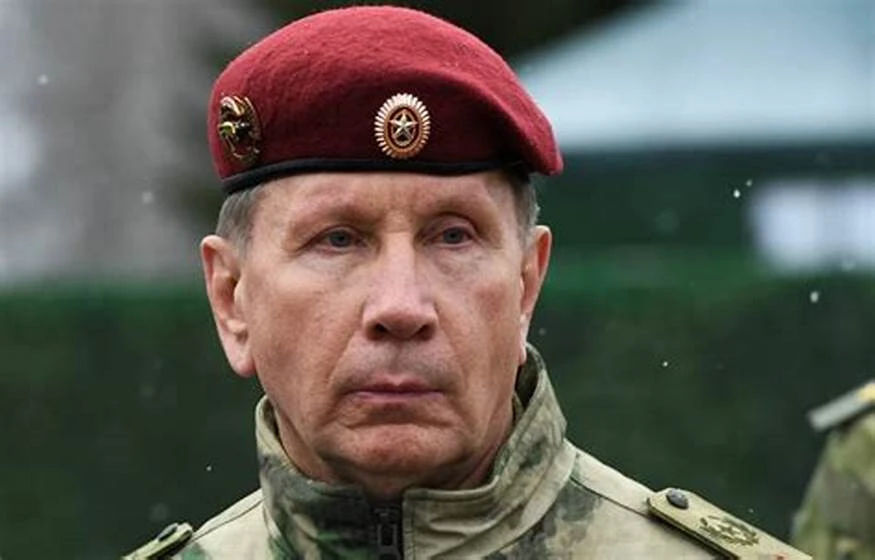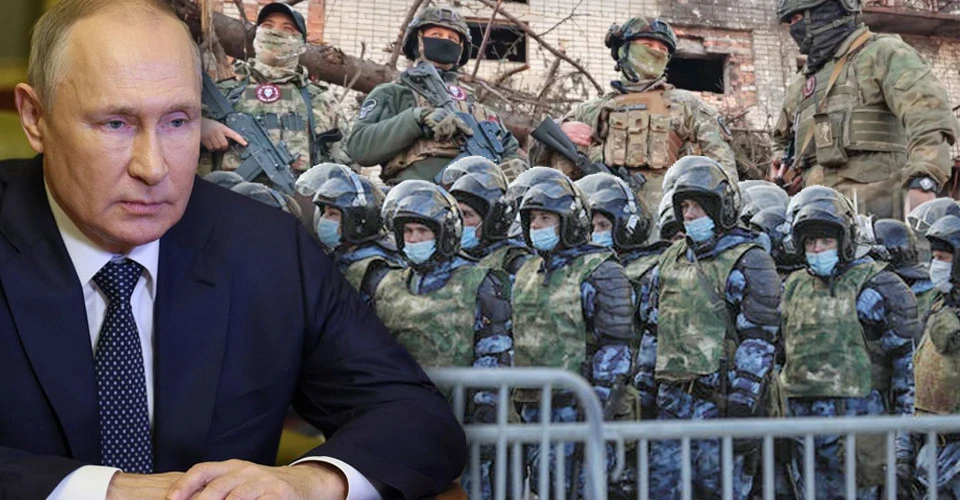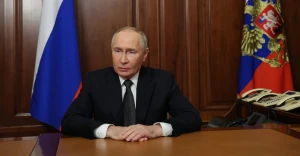
Putin's private army: on the Russian National Guard and why Kremlin is boosting its combat capability
The Russian National Guard, known as Rosgvardia or formally the Federal Service of the National Guard Troops of the Russian Federation, is a Russian internal military force created in 2016 out of Russian Interior Ministry troops. It is also involved in the full-scale invasion of Ukraine, and is subject to international sanctions.
Espreso explains in detail about the Russian Guard, its presence in the occupied territories of Ukraine, and why Putin has effectively turned it into his private army.
The structure of the Rosgvardia
The National Guard of the aggressor state is not much different from the Russian army. The structure of the Rosgvardia consists of national guard troops, a special purpose center, mobile special purpose units, command and control bodies and units of state control over arms trafficking, private security and non-departmental security.
The National Guard is divided into eight districts, which correspond to the military districts of the Russian Armed Forces. Each district has its own operational, special forces, aviation, engineering, communications, medical, and other units. The Rosgvardia also has educational institutions, research centers, sports facilities, and other organizations. The Director and Commander-in-Chief of the Rosgvardia is Army General Viktor Zolotov.
Viktor Zolotov is Putin's constant friend and the Kremlin's top poisoner

Photo: open sources
Zolotov has been the head of the Rosgvardia since 2016. He is also an army general, former deputy interior minister and former head of the Russian Presidential Security Service. He is a close friend and associate of Russian President Vladimir Putin, whom he has known since the 1990s. He is also accused of numerous corruption schemes, illicit enrichment, and participation in Russia's aggression against Ukraine. He has been under international sanctions since 2014.
Putin's bodyguard is described as a cruel and cunning man. Since the 1970s, he has served in the 9th Directorate of the KGB of the USSR, tasked with protecting top state officials and their families. In 1991, Zolotov was sent to St. Petersburg to protect Mayor Anatoly Sobchak. He engaged a private security firm, Baltic Escort, closely linked to criminal organizations and owned by a certain Roman Tsepov, to protect Sobchak's wife and daughter, Putin's goddaughter Ksenia Sobchak. And in 1994, the St. Petersburg mayor's office signed a contract for "protection of public order in the places of stay of Vladimir Putin," then vice mayor of St. Petersburg. Since then, Zolotov has been a firm friend of the Russian president. Moreover, he was his judo sparring partner.
Zolotov was also involved in the construction of Putin's palace in Gelendzhik, and he supervised everything, constantly coming to the site.
Zolotov is considered the Kremlin's chief poisoner.
"In the history of modern Russia, there are many episodes of poisoning of oppositionists, journalists and former FSB officers. Usually, they are all rather crudely executed and not all of them have achieved their goals. But one of the most high-profile among them - the poisoning of Navalny - is directly linked to Zolotov," TSN writes.
In April 2018, the U.S. Treasury Department added Viktor Zolotov to the sanctions list.
What functions does the Rosgvardia perform?
The Rosgvardia performs the function of internal troops. Officially, it is charged with maintaining public order, fighting organized crime, combating terrorism and extremism, territorial defense of the country; protection of important state facilities and special cargo; assistance to the FSB at the state border; supervision of arms trafficking, and supervision of private security activities.
The Rosgvardia is armed with various types of weapons and military equipment, such as:
-
Assault rifles, carbines, rifles, pistols, grenade launchers, sniper rifles, handguns, mortars, anti-tank missile systems, etc;
-
Armored personnel carriers, armored vehicles, tanks, artillery, anti-aircraft missile systems, helicopters, drones;
-
Special equipment for combating terrorism, riots, and arms control.
In fact, the main tasks of this formation are to disperse protests, suppress the opposition, and everything that concerns Putin's immediate interests, including participation in the armed aggression in Ukraine. This is not surprising, given that the head of the Rosgvardia is his loyal friend.
For example:
-
Anti-corruption protests in Russia on June 12, 2017, organized by opposition leader Alexei Navalny. The Rosgvardia used force and detained hundreds of protesters across the country.
-
The Russia 2017 protests, which took place from September to October 2017, demanded the resignation of President Putin and the holding of fair elections. The Rosgvardia also used violence and arrested many demonstrators.
-
The protest of truckers in Russia, which lasted from November 2016 to April 2017, against the introduction of tolls on federal roads. Rosgvardia blocked roads, dispersed truck convoys and detained activists.
-
Protests against the increase in the retirement age in Russia, which took place from June to September 2018, against a bill that raised the retirement age for men to 65 years and for women to 63 years. The Rosgvardia also suppressed them, using force and detaining thousands of people.
In the occupied Ukrainian territories, this service is engaged in filtering the local population and identifying members of the Ukrainian resistance. In addition, it was the Russian Guard who provided security for polling stations during the so-called "elections" held in the temporarily occupied territories in the fall of 2023. Now they are putting pressure on Ukrainians in the occupation in preparation for the "elections" that Russia wants to hold in March this year.
Strength of Rosgvardia in the occupied Ukrainian territories
The Russian Guard is provided with soldiers and employees through conscription and contractual volunteers. According to open sources, the number of soldiers is 340 thousand people.
But in Ukraine, where the Rosgvardia participate in the occupation, there are about 35 thousand of them. According to Ukraine's Resistance, they perform the tasks of filtering and detecting underground movement in the occupied territories.
“As of January 2024, the Russian Federation concentrated about 35,000 Russian Guardsmen on TOT. Half of them are regular formations, which are divided into brigades, 5 battalion-tactical groups and 44 tactical groups. The rest are more than 100 consolidated units, which are imported from the territory of the Russian Federation on a rotational basis.”
Putin strengthens internal troops
In July 2023, the Russian Federation began to reinforce the Rosgvardia with heavy equipment. In addition, according to British intelligence, on October 3, the Wagner PMC joined the Guard, and on January 3, 2024, the Vostok battalion from the so-called DNR joined the Guard. The so-called "Kadyrovites," (pro-Russian Chechen forces led by Chechen leader Ramzan Kadyrov – ed) by the way, are also part of the Russian Guard.
In addition, Russia is currently working to disband the Kaskad group, which specializes in drone operations. It is also planned to be incorporated into the Rosgvardia.
Ukrainians are well aware of the combat "merits" of the Wagnerites and Vostok militants, but let's talk about Kaskad more. In 2022, Bihus wrote about these traitors - Kaskad was directly involved in the destruction of Mariupol, killing city residents and the Ukrainian military. Its members first stormed and methodically destroyed Mariupol, and then, working for the cameras, brought food packages to the surviving residents and organized "excursions" for the propaganda media.
The group of traitors is led by Oleksiy Dykyi, a former serviceman of Ukraine's Interior Ministry. In the spring of 2014, he was appointed head of the Department for Combating Organized Crime in Donetsk region. However, he betrayed his oath, seized the building of the Department with militants and went over to the side of the invaders. For his crimes in Ukraine, Dykyi was sentenced to 12 years in prison.
According to the Conflict Map project, Dykyi "is considered one of three security 'ministers' who are accountable to and appointed directly by their curators in Moscow." He is also credited with organizing the so-called "parade of Ukrainian prisoners" in Donetsk, "covering up" smuggling, and creating a business for legalizing stolen cars in the so-called DPR.
Rosgvardia is Putin's private army
Viktor Yahun, Ukrainian Security Service reserve major general, also told Expreso about the strengthening of the Rosgvardia.
"The Rosgvardia is being equipped with tanks, and soon they will have their own aviation. This means that some of the army's functions are being transferred to the Guard. Why? Because Zolotov is perhaps the closest person to Putin, and he most likely trusts him immensely. This is all happening because Putin is afraid of a social explosion before the elections. Not a political one, there is no one there to do anything politically," the major general comments.
He notes that Russians are now most concerned about social problems. From time to time, indignation turns into protests. And when Putin announces a general mobilization, it can turn into something more. And at such a rather dangerous moment, it is impossible to rely on the army, because it has to fight in Ukraine. That leaves the Rosgvardia and Zolotov.
Journalist Vitaly Portnikov also analyzed the processes that are currently taking place with the Russian Guard. Thus, he notes that the Rosgvardia is being reinforced by those with combat experience.
"This means that Vladimir Putin has taken into account his own mistakes that he previously made with the Wagner PMC members, who were only formally subordinate to the Russian leadership and were de facto independent military units," Portnikov says.
An attempt to subordinate the Wagner PMC to the Russian Defense Ministry ended in a mutiny. At the same time, Putin could not help but notice that the army did not put up much of a fight against the Wagner mercenaries marching toward Moscow.
"In fact, in the best traditions of the Roman emperors, he is creating a kind of Praetorian Guard. I do not exclude that after his death, they will be the ones who will choose who will become the next leader of the Russian Federation and who will be the heir to his chauvinistic course," the journalist comments.
- News













































